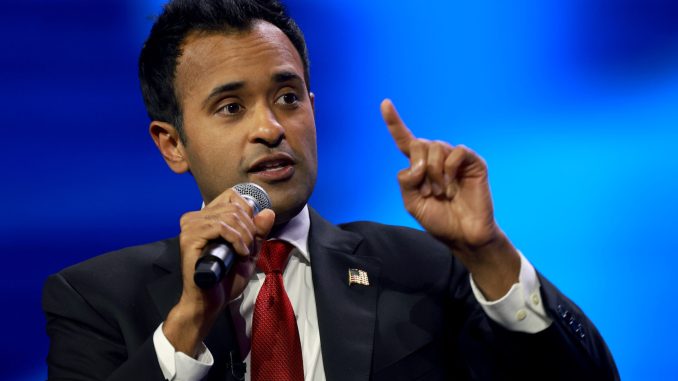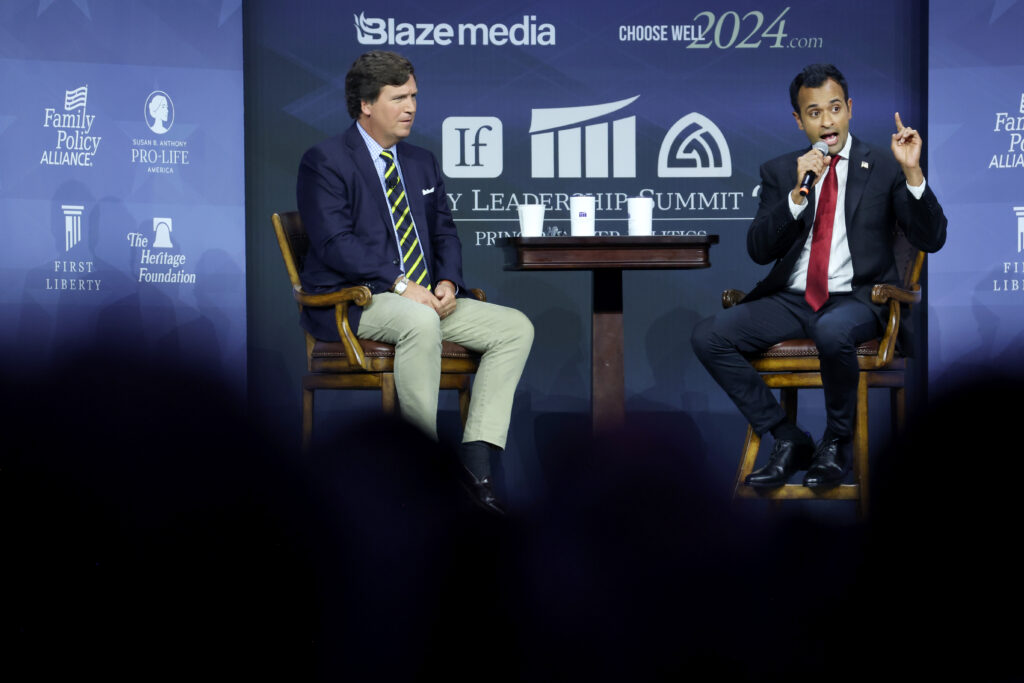
Presidential candidate Vivek Ramaswamy said last week that he isn’t supportive of a federal ban on abortion, and he touted the difference between himself and his fellow Republican candidates on this point. The Daily Signal has learned that the presidential candidate is reportedly discussing with scholars whether federal protections for the unborn would be constitutional.
“He is open to the constitutional argument for a federal abortion ban,” campaign manager Tricia McLaughlin told The Daily Signal on Thursday.
Last week, Ramaswamy discussed abortion on the “All-In Podcast” where he said that he believed Roe v. Wade to be unconstitutional and described himself as “personally pro-life.” But the presidential candidate clarified that he wouldn’t use the power of his presidency to ban abortion across the nation — a position that may put him at odds with religious and pro-life Republicans.
“My view, as someone who is running for U.S. president, responding to the question about the Supreme Court case, was that Roe v. Wade was correct to be turned on constitutional grounds,” he explained on the podcast. “It was made-up jurisprudence … it leads also to the path to moving forward, which is, that I think the federal government should stay out of it.”
He continued: “I think I’m the only Republican candidate in this field who has come out and said, ‘I would not support a federal abortion ban of any kind.’ On principled ground, because I am grounded in constitutional principles, and I think there’s no legal basis for the federal government to legislate.”

Ramaswamy, who has described himself as “unapologetically pro-life,” emphasized that he believes abortion is a state’s issue.
“I’m personally a believer that unborn life is life. I think that the pro-life movement needs to walk to walk when it comes to being pro-life,” he continued. “What do I mean? I’m pro-contraception. I’m pro-adoption. I’m pro-childcare. I’m pro-more responsibility for men. For God’s sake, we live in an era of genetic tests, we can actually put more responsibility on men. This doesn’t have to be, and should not be a men’s versus women’s rights issue.”
Ramaswamy dodged answering exactly where he thinks states should draw the line on abortion, emphasizing, “Unlike other Republican candidates, I will not be signing a federal abortion ban on constitutional grounds.”
He did say that he is open to persuasion, saying that if legal scholars can convince him that the Constitution gives the federal government the authority to sign such a law, “so be it.”
“But I have not been so convinced,” he said, “and I think many other principled constitutionalists haven’t been convinced even though the other Republican field has all said they would sign one.”
In May, Ramaswamy similarly told CNN: “I don’t believe a federal abortion ban makes any sense, and I say this as somebody who is pro-life. This is not an issue for the federal government. It is an issue for the states. I think we need to be explicit about that. If murder laws are handled at the state level, and abortion is a form of murder, the pro-life view, then it makes no sense for that to be the one federal law.”
Former President Donald Trump, the GOP front-runner, appointed three of the six Supreme Court justices who overturned Roe v. Wade. Trump formerly endorsed a ban on aborting babies that had reached the 20th week of pregnancy, but recently drew concerns from pro-lifers by suggesting that Republican Florida Gov. Ron DeSantis’ 6 week abortion ban was “too harsh.”
While Trump’s recent remarks have provoked concerns from pro-life groups that he does not support strong legislation protecting life, he has previously been heralded as the most pro-life president in American history—and he will always have the lasting legacy of overturning Roe v. Wade.
DeSantis hasn’t definitively said what kind of national abortion ban he supports, though he has said he would sign “pro-life legislation,” indicating that this may take time as well as building “a culture of life.”
“I will be a pro-life president, so I mean, of course I want to sign pro-life legislation,” he told Tucker Carlson in early July. “At the end of the day, you get into office to do what’s right. And you’ve got to stand on principle and you’ve got to say, why am I here? If you’re here to contort yourself into a pretzel to try to not have to take on big issues, to take the political road that’s easier traveled, then you’re not somebody that’s dependable.”
Former Vice President Mike Pence has challenged the 2024 field to support a national 15-week abortion ban (mirroring messaging of Susan B. Anthony Pro-Life America whose president promised: “We will oppose any presidential candidate who refuses to embrace at a minimum a 15-week national standard to stop painful late-term abortions while allowing states to enact further protections”).
Pence is the most vocal of the candidates when it comes to abortion.
“Now that Roe v. Wade has been consigned to the ash heap of history, a new arena in the cause of life has emerged…” he said in June 2022. “Having been given this second chance for Life, we must not rest and must not relent until the sanctity of life is restored to the center of American law in every state in the land.”
Presidential candidate Nikki Haley has said she would sign a 15 week ban if it made it through Congress, but guesses this is unlikely. She has also emphasized the importance of consensus, and like Ramaswamy, emphasizes the availability of contraception in her messaging.
Sen. Tim Scott of South Carolina confirmed to Newsmax in April that he would support a 15 week ban, or stricter, if Congress would pass the legislation: “I would sign the most conservative pro-life legislation you can bring to my desk.”
Gov. Asa Hutchinson of Arkansas suggested to Fox News in April that he would sign a 15 week ban if elected president: “I’ve always signed pro-life bills. A pro-life bill that comes to me that sets reasonable restrictions, but also has the appropriate exceptions, yes, I would sign it.”
Have an opinion about this article? To sound off, please email letters@DailySignal.com, and we’ll consider publishing your edited remarks in our regular “We Hear You” feature. Remember to include the url or headline of the article plus your name and town and/or state.

